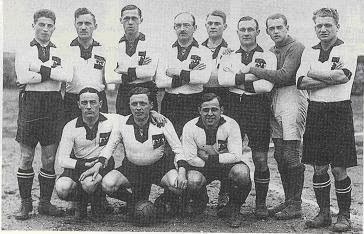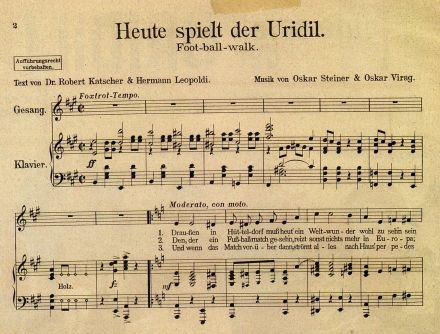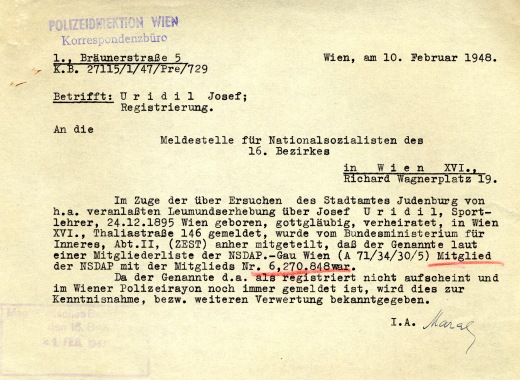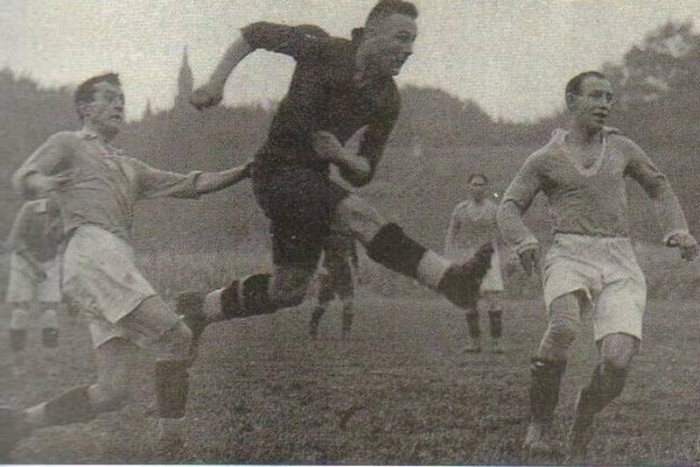To listen to the embittered fathers and grandfathers of the modern footballing world, it would be easy to assume that the footballing celebrity is a purely modern phenomenon, inextricably linked to everything that is wrong with what was once the people’s game.
Zlatan has his cult of personality, Pogba his emojis, Beckham had just about everything else, and this is allegedly a symptom of the sickness which plagues the sport. Players have their heads turned by advertising contracts, music videos, and social media campaigns when they should be concentrating on their football, and you can bet that things weren’t like this in the good old days.
Those who subscribe to this view have never heard the story of Josef ‘Pepi’ Uridil. Striker, film star, musical muse and entrepreneur, the Rapid Vienna striker was Austria’s first footballing celebrity – and he was born in the 19th Century.
Early years and World War One
Born on Christmas Eve of 1895 in the Western Viennese district of Ottakring, Uridil found his footballing education on the streets of Vienna with his older brother, Franz. He played for a number of local sides throughout his youth before being spotted by Blue Star Vienna and eventually moving to Rapid in early 1914. Soon after, Austria-Hungary declared war on Serbia.
The Great War put an immediate halt to the teenage Uridil’s nascent footballing career, and he was drafted into the Austro-Hungarian military in 1915. He was wounded in battle early on in his service and returned to Vienna, but did not play football again until the end of the war.
As Austria-Hungary dissolved in the aftermath of wartime defeat, Uridil’s life returned to normality and he began to establish himself as a striker of some talent once more. Powerful and predatory, he earned himself the nickname ‘der Tank’ for his crosshair-accurate finishing and averaged more than a goal every game for the three seasons after the war, winning the Austrian Cup twice in the process.

Miracle comeback and the Rapidgeist
35 goals in 22 games saw ‘Pepi’ at his peak throughout the 1920/21 season, and it was the culmination of this campaign which secured his legend. Playing in the Championship game against local rivals Wiener AC, Rapid found themselves 5-1 down at the break and, despite a fightback, trailing 5-3 with 15 minutes to go.
Led by Uridil, Rapid scored four in fifteen minutes to win 7-5. This was where, as endorsed by the official governmental website of Vienna, the then 25-year-old introduced himself as ‘the incarnation of the Rapidgeist’.
Essentially a measure of strength and endurance, this fighting spirit is the self-reflective embodiment of the club which would go on to become Austria’s greatest.
International outcast, cultural icon
With Austria left as one of the nations saddled with guilt for the nightmare of war, the national team played but a small number of matches in the post-war period and Uridil suffered a lack of international recognition as a result. He played eight times for his country throughout his career and his prolific nature shone through with a goal-per-game ratio.
What recognition he lacked on the international stage, though, he more than made up for in Austria with numerous exploits outside of football cementing his status as a true sporting celebrity.
A keen entrepreneur, he soon put his name to double malt Uridil Beer – sold in football-shaped bottles - and Uridil sweets among numerous other products, while famed Austrian composer Hermann Leopoldi wrote the foxtrot Heute Spielt der Uridil (‘Uridil is Playing Today’) in his honour.
His impact on the cultural scene in Austria is not to be understated. The song was a hit in Vienna, and elevated Uridil’s status to that of legend. He was awarded the honorary title of Mayor of Vienna, and in 1924 made his silver screen debut in the film Pflicht und Ehre (‘Duty and Honour’).
He appeared at the February premiere, held at Vienna’s largest cinema, in the green and white of Rapid alongside legendary Austrian comic actor Hans Moser. As the credits rolled at the end of the film, such was the household nature of his name that he was listed only as ‘Uridil’.

A managerial nomad
Aged just 31, this leading light of the Austrian game brought his playing career to a premature conclusion at the end of the 1926/27 season. His extracurricular activities couldn’t hold his attention away from football for too long, however, as within two years he had moved into coaching.
Waving goodbye to Vienna, Uridil moved around Europe during his coaching career and he led the Romanian national team during the 1934 World Cup. They were beaten in the first round by eventual finalists Czechoslovakia, and he continued his nomadic coaching existence at clubs in Serbia, Switzerland, and Germany.
As manager of Schwarz-Weiß Essen at the outbreak of the Second World War, he served in the German Army and, as a member of the Nazi party from 1938, was categorised as a ‘minor offender’ in the post-war fallout. This title was later removed by a pardon from the Austrian Federal President.

His love affair with football came to a conclusion, fittingly, at the scene of his greatest romance. At the beginning of the 1953-54 season, it was announced to a delighted Viennese public that Uridil, their greatest player, would return to the club as manager.
Robert Dienst – seven places ahead of Uridil in the club’s all-time top scorers chart – rattled in 25 goals as Rapid swept to their 19th league title, 35 years after Uridil had led them to their fifth. His side’s class underlined by a 6-1 thrashing of Arsenal, it would be his sole season as the club’s manager.
He might not be Austria’s greatest ever footballer. Matthias Sindelar, the captain of the 1930s ‘Wunderteam’ who was seemingly murdered by the Nazis, takes that crown for most. But in Pepi Uridil, Austria had their first footballing celebrity.









































